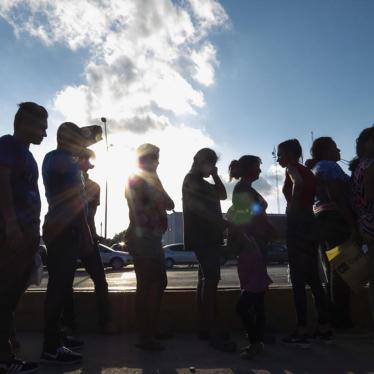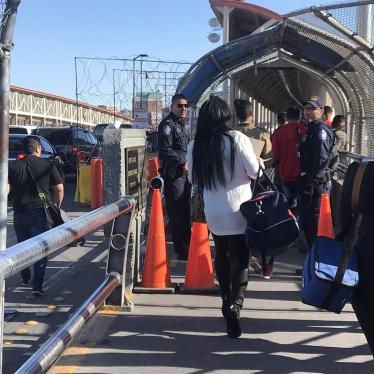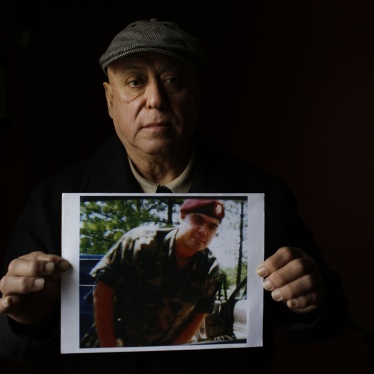(Washington, DC) – The United States government is deporting Salvadorans to face risk of murder and other serious abuse, Human Rights Watch said in a report released today.
The 117-page report, “Deported to Danger: United States Deportation Policies Expose Salvadorans to Death and Abuse,” identifies cases of 138 Salvadorans who, since 2013, were killed after deportation from the United States, and more than 70 others who were beaten, sexually assaulted, extorted, or tortured. Perpetrators of these abuses include gangs, former intimate partners, and Salvadoran police or security personnel.
“US authorities have knowingly put Salvadorans in harm’s way by sending them to face murder and attacks on their safety,” said Alison Parker, managing director of the US Program at Human Rights Watch and co-author of the report. “Salvadorans are facing murder, rape, and other violence after deportation in shockingly high numbers, while the US government narrows Salvadorans’ access to asylum and turns a blind eye to the deadly results of its callous policies.”
International law binding on the United States prohibits the return of anyone to a country where they face serious risks to their lives or safety. The United States is not solely responsible – Salvadoran gangs and Salvadoran authorities who harm deportees or who do little or nothing to protect them bear direct responsibility – but in many cases the United States is putting Salvadorans in harm’s way in circumstances where it knows or should know that harm is likely.
In order to make the United States more capable of responding to the current realities of forced migration, Human Rights Watch calls on the United States to go beyond the narrow reach of its asylum laws by providing broad protection to anyone, like many of the Salvadorans featured in the report, who would face a real risk of serious harm upon return.
Based on a year and a half of research in El Salvador and the United States, Human Rights Watch interviewed close to 150 people for the report, including deportees, surviving family members, Salvadoran nongovernmental workers, government officials, and US immigration attorneys.
The deported killed or abused Salvadorans featured in the report include:
- “Jacinto K.,” who with his wife had been ordered deported from the United States after living there for several years and returned to El Salvador with their three children, including Óscar, who we interviewed when he was 15 years old. Jacinto was shot dead in public just two weeks after our interview. The family believes gang members to be responsible for the killing. Óscar now moves between houses in hiding.
- “Adriana J.,” a former Salvadoran policewoman, who fled to the United States after being threatened by gangs, was denied asylum and deported back to El Salvador in 2015 or later, where gang members shot her in 2017.
- “Angelina N.,” who fled abuse at the hands of a male gang member but was deported in 2014 and who was raped repeatedly by the same gang member after her return to El Salvador.
- Cousins “Walter T.” and “Gaspar T.” fled gang recruitment when they were 16 and 17 years old, respectively. They were denied asylum and deported by the United States to El Salvador in 2019. Soon after arriving back in the country, police officers took them from their homes and held them in the police barracks, where police beat them repeatedly while claiming they would be charged with gang membership. After three days in custody, police released Walter and Gaspar without charges.
- “Gabriel G.,” who worked in the Salvadoran military and was therefore targeted by gangs, fled to the United States but was deported in 2018. Now gang members harass Gabriel, his wife, and children regularly. They come to the gate in front of his house and threaten to kill him.
El Salvador is not a safe country for many deportees. Human Rights Watch documents the risks of extortion and abuse faced by former long-term residents of the US and details how particular neighborhoods of origin in El Salvador can heighten the risk of harm to deportees.
“People deported to El Salvador often face the same abusers and harm they originally fled, including by government officials,” Parker said. "Salvadoran deportees from specific neighborhoods or those who lived in the United States for some time, face additional heightened and unique risks.”
Of the estimated 1.2 million Salvadorans living in the United States who are not US citizens, just under one-quarter are lawful permanent residents. The remaining three-quarters either lack papers, hold a temporary status, or have a pending asylum claim. The Trump administration’s efforts to narrow asylum eligibility by executive fiat and return asylum seekers to Mexico under the “Remain in Mexico” program make it likely that recognition rates for Salvadorans, which were only 18.2 percent from 2014 to 2018, will fall.
“Instead of closing the door to the thousands of Salvadorans fleeing their homeland, the United States should provide them with full and fair asylum procedures and dignified treatment,” Parker said. “Before deporting Salvadorans, US authorities should take into account the extraordinary risks of harm they may face upon return.”










